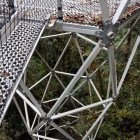Think-tank on Resilience July 2011
July Think Tank on Resilience - Identifying Key Themes
The first meeting in the Moving Towards Resilience events was held on July 28-29th in the Bulkley Valley. It was held much like a ‘think tank’ with a small group of people gathering together to brainstorm a regional approach to energy conservation and examine the subject of adaptation and resilience in light of peak oil and climate change. We also wanted to understand what others are doing and how to complement or leverage initiatives, moving towards a more comprehensive process of community resilience in the face of these challenges.
We worked around the framework that the Northwest experiences multiple stressors in relation to climate change and energy. Some of these relate with energy production (such as the proposed pipelines threatening river and coastal ecosystems and traditional lands) and energy consumption (such as, the rising price of gas and food). We live in a context in which oil is becoming less and less available and thus the gas prices become higher and higher, while at the same time modern life is increasingly set up to consume more and more fossil fuels. Every year we are experiencing more frequent impacts of a changing climate, as unpredictable weather events becoming more common. These intersecting issues present a clear need for us all to invest in our community’s resilience.
The first day was focused more on big picture thinking, philosophical thinking and ‘thinking about thinking’
The second day became more focused; we were more action-oriented, getting specific about certain things, and working on a final outcome of the meeting.
In both these meetings we discussed what the group felt were some gaps in the Northwest in terms of energy and we also brainstormed many of whom we thought were key people from communities in the Northwest as well as in the energy industry. We also examined potential scenarios for the North along three axis: 1) price of gas and oil going up, 2) change in climate, and 3) globalization.
By the end of the second day, we had been philosophers, environmentalists, realists and activists. We talked about many of the issues we are faced here in the Northwest, what individual concerns were and how we were going to tackle it all one step at a time, as a community, as a community with resilience. We built up what we felt is an interactive and problem solving approach. We talked a lot about what we were going to need in terms of resources and information for the second meeting that we are hosting in September, which will be open to a significantly larger group of people.

